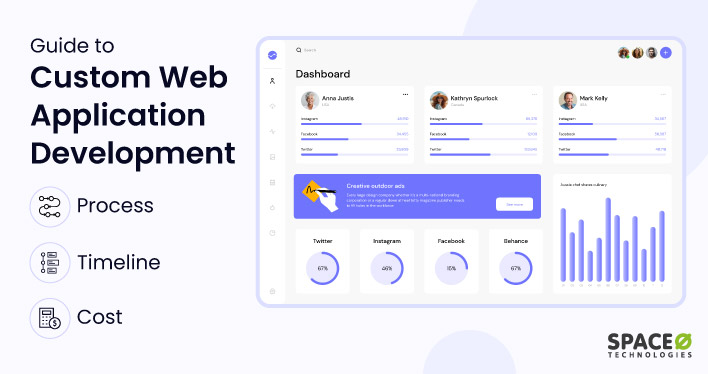- The timeline to develop a web application ranges from 2 to 12+ months for simple and complex web app development.
- The cost associated with developing a custom web application approximately ranges from $15,000 to $100,000+ for small and complex web app development.
Key Takeaways
Do you want to develop a custom web application for your business? If yes, then you are at the right place.
As a leading web app development services provider in the USA, we understand what goes into building custom web applications.
Having developed 350+ web app solutions and worked with Fortune 500 companies, we know the process, cost, and time it takes to build a web app solution. To make it easy for you in developing web app solutions, we have written a complete guide on custom web app development.
Before we discuss the custom web application development process, let us first explore the definition of the custom web application.
Table of Contents
What is a Custom Web Application?
A custom web application is a specialized or tailor-made software solution developed to address the unique business needs, processes, and challenges of a specific business or organization. The primary objective of a custom web application is to:
- Provide a highly personalized and efficient digital solution
- Enhance business operations and processes
- Promote innovation within the business
- Offer a competitive advantage in the market
But, how to develop a custom web application.
Well, the process of developing a web application is complex. But, if you follow the step-by-step process, you can even develop a web app with no technical knowledge. We assist you with web-based application development work that enables you to create a web application as per your business needs.
However, if you are in search of a web application or ready to use web app development then you can check out our blog on steps to build a web application. This blog will help you with the process of developing web apps that are easy to develop, deploy, and cost-effective.
Transform Your Business with Scalable Web Applications
Partner with Space-O Technologies to build dynamic, custom web applications designed to drive growth and enhance user experience.

Coming back to our topic, let’s check out the process of developing web apps in easy steps in the following section.
7-Step Custom Web App Development Process
As we mentioned above, developing web apps can be complicated, but the simple steps mentioned in this section will make your web app development process easy. We’ll break down each step and give you clear guidance throughout the process.
Let’s explore.
Conceptualization and Planning of Your Web Application
This phase serves as the blueprint for the entire project, ensuring everyone involved in the project has a clear vision of the web application’s objectives. By defining the scope, setting timelines, and estimating budgets, potential challenges can be addressed in the development process.
To make your custom web app development successful, you should consider the following steps mentioned below:
- Clearly define why you need the web application.
- Identify the main objectives and outcomes you want to achieve.
- Gather insights into customer preferences, behaviors, and pain points.
- List down the specific needs and problems your web app needs to address.
- Plan the features and functionalities you want to include in the initial release.
- Study your industry and competitors to identify trends and gaps.
- Estimate the budget required for development, testing, and launch.
Once the conceptualization and planning phase is complete, you’ll have a clear roadmap for the development of your custom web application. This step ensures that the process is aligned with the business objectives and user needs, reducing the chances of costly changes or rework later on.
Hire a Web Application Development Company
Once you have planned overall custom web app development, ensure you hire a custom web application development company with expertise in developing custom web apps. With so many options available to choose from, you should choose the company that has the experience of working with various industries.
There are various factors that you should consider while hiring a custom web app development company such as:
- The company must have a skilled team of web application developers proficient in multiple programming languages, frameworks, and web technologies necessary for your project.
- Examine past projects to know the quality of their work.
- The company should be responsive to your inquiries and keep you updated on the project’s progress.
- Understand their development methodology, be it Agile, Waterfall, or another approach.
- Get a clear understanding of their pricing model: fixed price, hourly rate, or time and material.
- Ensure there are no hidden costs and understand the terms of payment.
- Ensure the company follows best practices for data security, especially if your application deals with sensitive information.
- Interact with the multiple developers, designers, and project managers who will be working on your web application project.
However, if you want to hire a web app developer or web app development team we can help you with that. We at Space-O Technologies have skilled and experienced custom web application developers who have experience developing enterprise web apps for healthcare, education, and travel.
Having developed 350+ web app projects, we understand the nuances of developing custom web apps as per your custom requirements. Want to connect with us? Just book a free consultation for your web app development.
Select Technology Stack for Your Web Application
Once you get in touch with a web app development company, the company helps you to select the technology stacks as per your business type and requirements. The web app development team chooses technologies that are scalable and futuristic. Here is the general technology stacks required for custom web app development.
Components Technologies Front-end Languages HTML, CSS, JavaScript Front-end Frameworks React.js, Angular, Vue.js Back-end Languages Python, Java, Ruby, Node.js, PHP Back-end Frameworks Django (Python), Spring Boot (Java), Ruby on Rails (Ruby), Express.js (Node.js), Laravel (PHP) Databases (Relational) MySQL, PostgreSQL, MS SQL Databases (NoSQL) MongoDB, CouchDB Server & Hosting AWS, Google Cloud, Azure; Server Technologies: Nginx, Apache Middleware & APIs RESTful APIs, GraphQL Authentication & Security OAuth, JWT, SSL/TLS Development Tools Version Control: Git (GitHub, Bitbucket); CI/CD: Jenkins, Travis CI, CircleCI Mobile Responsiveness Bootstrap, Foundation Performance & Monitoring Google Lighthouse Scalability Microservices, Serverless Computing This table provides a general overview of technologies for each component of a web application. The specific choices within each category would depend on the project’s requirements.
Moreover, while selecting your app tech stack the company takes care of the following consideration.
- The tech stack should meet the expected performance criteria, be it in terms of speed, real-time processing, or data handling.
- If a quick launch is essential, companies might opt for frameworks and platforms that speed up development, even if they might not be the best long-term solution.
- Applications handling sensitive data, like financial or health information, need to prioritize security in their tech choices.
- If the application needs to integrate with existing systems or third-party services, the tech stack should be compatible or capable of seamless integration.
- The technologies chosen comply with industry regulations and that licensing won’t become a future issue.
However, if you want to know more about the framework, tech stack, or programming language for your custom web app development, refer to our blog on the top web application frameworks for web app development. From this blog you will learn about The blog will help you with the list of the latest web app frameworks and their importance.
Wireframing and Designing Your Web App
At this stage, the business analyst team creates a skeletal representation of your web app, laying out its structure, web app’s functionality, and core user interface elements. This wireframing process offers a visual guide that represents the app’s layout and the flow between screens, ensuring that all stakeholders share a unified vision of the final product.
Once the wireframe is designed, the UI/UX team enhances the visual and interactive aspects of the web app. They transform basic wireframes into detailed, high-fidelity designs, ensuring a blend of aesthetics and user-friendly navigation. Using tools like Figma or Adobe XD, the UI/UX designers create prototypes.
This helps you to know the web app’s flow before development begins. This team’s role is to ensure that the final product is not only visually appealing but also intuitive and engaging for the end users.
Custom Web Application Development
In this phase, your conceptualized ideas, designs, and planned functionalities are transformed into a tangible, working product. After finalizing the design your custom web app will get developed. For the basic structure, the developer creates the layout using HTML that potential users see on their screens.
And to ensure that the app is visually appealing, responsive, and user-friendly web developers work on the client side of the application, building the user interface using CSS and JavaScript.
During this phase, you will receive regular updates about your project’s progress. These updates ensure that the product aligns with your initial vision and that any potential challenges or adjustments are transparently communicated. Your feedback ensures that the final product not only functions flawlessly but also resonates with your business goals.
Testing and Deployment of Your Custom Web App
- The development team makes sure the app works smoothly and is easy to use by getting real users to try it out.
- Developers test the app in various scenarios to ensure it behaves correctly in different situations.
- They make sure the servers that run your app are set up properly for a smooth experience.
- They implement measures to keep user data safe from any unauthorized access.
- Developers review all the aspects to ensure that your app is ready to go live.
Launch, Monitor, and Maintenance of Your Web App
After the development process, your web app is deployed to be accessible across multiple browsers.
However, there are multiple factors that are taken into consideration by custom web app developers before going live such as:
- Selecting a hosting provider that suits your web app’s requirements.
- Registering a domain name that reflects your web app’s identity and purpose.
- Deploying your web app to the chosen server using tools like FTP, Git, or deployment scripts.
However, after the deployment web app development team help you implement analytics tools that continuously analyze user traffic patterns to understand user behavior and identify areas for improvement.
Moreover, the web app development team continuously improves your app by adding new features and enhancements based on user feedback and changing requirements. They provide responsive user support to address user inquiries, feedback, and issues.
After making your web app live make sure you market it properly to generate traffic and to make people know about your web app.
Now, you know the entire process of developing a web app. However, you might want to know about the features to integrate to develop custom web applications. Let’s understand.
After development, the QA team tests the web application to identify and fix bugs, errors, and issues in the application. They consider the following testing and deployment steps before launching it on the online platform.
After considering the following steps, the custom web app development team fixes the bugs if they found any and make sure the issues are resolved properly. After resolving the issues the app is sent for deployment, where the team conducts a thorough code review to ensure that the codebase meets coding standards.
Moreover, the team sets up monitoring tools to track the app’s performance and scalability in the production environment before going live.
Tracking the scalability and performance is key to app consistency hence monitoring it accurately is important. However, if you want to enhance your app scalability and make your app ready to handle mass traffic then you can check our blog on how to effectively scale a web application. The blog will help you with relevant tips to enhance your app’s scalability to support a million users.
Do You Have a Custom Web App Idea?
Let’s discuss together and bring your idea into implementation. We have experienced custom web app developers who can convert your idea into reality.
Simple and Advance Features to Integrate with Custom Web App
When developing a web application, the features you integrate should align with the specific needs of your target audience and the objectives of the application. Here’s a comprehensive list of potential features to consider:
| Features | Description |
|---|---|
| Search Functionality | Enables users to find content or products easily. |
| Contact & Feedback Forms | Provides a method for users to get in touch or give feedback. |
| Social Media Integration | Enables content sharing and social logins. |
| Notifications | Keeps users informed about updates or interactions. |
| eCommerce Capabilities | Supports product listings, shopping carts, and online payments. |
| Analytics & Reporting | Provides insights into user behavior and app performance. |
| Real-time Interactions | Features like chat or live updates. |
| Third-party Integrations | Connects the app with external tools or platforms. |
| APIs | Allows the app to communicate with other software or services. |
| Multi-language & Multi-currency Support | Serves a global audience with language and currency options. |
| Advanced Security Protocols | Enhances app safety with features like encryption and two-factor authentication. |
| Progressive Web Applications Features | Offers offline capabilities and app-like features for web platforms. |
| User Dashboard | Personalized user area with relevant data and settings. |
| Forums & Community Features | Spaces for users to interact, discuss, or share insights. |
| Machine Learning & AI Integration | Advanced features like chatbots or predictive analytics. |
| Subscription Models | Allows content or feature access based on subscription tiers. |
| File Upload & Management | Lets users upload, store, and manage files or documents. |
When deciding on features, prioritize based on the web application’s primary purpose, user needs, and budget constraints. Since you know the features, let’s understand the cost of developing a web app.
How Much Does it Cost to Develop a Custom Web Application?
However, the cost may vary depending on the web application’s complexity, design, user interface, the experience of a web application developer, and functionalities. Refer to the table below to see the cost of developing a custom web application, taking into account the complexity of the app.
Here is the table with the cost of a custom web application considering the complexity of the app:
| Web App Type | Cost | Example |
|---|---|---|
| Simple web apps | $15,000 – $25,000 | Blogging Platform, Portfolio website, Local business directory |
| Medium web applications | $25,000 – $45,000 | E-commerce web application, Online learning platform, Event booking system |
| Complex web applications | $50,000 – $100,000+ | Customer relationship management system, Enterprise resource planning system, Healthcare management system |
Please note, the mentioned cost in the table is estimated costs. If you want to own the exact cost of a custom web application, kindly get in touch.
However, if you want to know the in-depth and precise cost of developing a custom web app, then you can check our blog on web application development cost. The blog provides complete information about cost of web app development, the factors affecting cost, and tips to reduce the cost of web application development.
Nevertheless, after discussing the cost of developing a custom web application, let us move to the next section which will provide you with information on the timeline for developing web applications. Let’s explore.
How Much Time Does it Take to Develop a Custom Web Application?
The timeline can vary depending on the complexity of the project, design, and scope changes. However, to get complete timeline information about custom web applications development you can refer to the table below. This table can help you with in-depth information on customized web application development and help you in making informed decisions on your web applications.
Let’s check the table below and gain knowledge on custom web application timelines.
| Development Phase | Simple Web App | Medium Web App | Highly Complex Web App |
|---|---|---|---|
| Project Planning | 1-2 weeks | 1-2 weeks | 2-3 weeks |
| Design and UX/UI | 2-4 weeks | 4-8 weeks | 6-9 weeks |
| Frontend Development | 4-8 weeks | 8-16 weeks | 9-12 weeks |
| Backend Development | 4-8 weeks | 8-16 weeks | 12-18 weeks |
| Integration and Testing | 1-2 weeks | 2-3 weeks | 6-9 weeks |
| Refinement and QA | 1-2 weeks | 2-3 weeks | 3-4 weeks |
| Deployment and Launch | 1-2 weeks | 1-2 weeks | 1-2 weeks |
Kindly note the timeline provided in the table is an approximate timeline it may vary depending on project complexity and project scope.
After knowing the timeline of custom web applications, let’s understand why Space-O technologies is the right choice for your needs.
Why Choose Space-O Technologies for Custom Web Application Development?
Being a leading web app development company, we have experience in developing highly customizable and complex web applications for any business type. We have proven expertise in customized web application development solutions that helped many organizations with transformation, scalability, and efficiency.
Here’s why we’re the perfect fit for your unique vision:
- 14+ years experience in crafting successful web apps.
- Delivered 350+ web app solutions for different industries like healthcare and education.
- 50+ web app developers are skilled in different languages like Python, PHP, Java, Node.js, and Ruby.
- Have experience in working with 1200+ clients including Fortune 500 companies and top brands like Nike, Saint-Gobain, and Glovo.
- Earned 98% of job success & a “Top-Rated Plus” Badge on Upwork.
- 100% transparency with no hidden cost during your web app project development
- Have offices in India, the USA, and Canada for easy global collaboration.
Knowing our expertise and experience let us help you make your web app dream a reality. You can be in touch with our experts to discuss your web app idea and get the right custom web app development solution for your business needs.
Now, let us move ahead to the next section of frequently asked questions where you can find the answers to your question and clear your doubts.
Frequently Asked Questions About Custom Web Application Development
Are portal web applications and custom web applications the same?
No, a portal web app and a custom web application are not the same.
A web portal application is built for specific users and companies to get all useful information, tools, and documents at one centralized platform. For example a portal web app of a university where students can access all the important information by logging into the website about the learnings, courses, calendar, events, and announcements from one centralized location.
A custom web application is like a special website created just for certain users. For instance, small businesses such as bakeries, medical stores, or cloud kitchen owners might make a website to handle their online orders. This website lets customers order online, helps the staff keep track of orders, and lets the owner manage their supplies.
How to choose a reliable custom web-based application development partner
Look for a development partner with a strong portfolio, relevant experience, positive client reviews, and a clear understanding of your business goals. Communication, transparency, and a collaborative approach are also essential factors to consider.
What types of custom web applications can you develop for your business?
You can opt for a variety of web applications, including:
- eCommerce Platforms: Tailored online store for selling products.
- Content Management System: Systems designed for easy content creation, editing, and management.
- Customer Relationship Management System: Tools to manage leads, customer interactions, and sales pipelines.
- Enterprise Resource Planning System: Comprehensive systems that integrate various internal processes.
- Learning Management System: Platforms for managing educational content, student registration, and progress tracking.
Ready to Develop a Custom Web Application?
Picking the right custom web application development team is important for your app idea to get success. However, to make your app idea a reality we have discussed the complete process of custom web app development with its advantages, costs, and timeline. Whether you want to develop a dynamic web application, vendor web app, B2B/B2C web app, or any other complex web application we can help you.
If you still have a question or need assistance with your custom web development services you can get in touch with us.
We have an experienced web app development team with proven expertise and skills, who help various industries to transform. Whether it is about transforming an existing site or want to develop a new custom web app we will help you with every solution.



